Suchergebnisse
IEA Bioenergy Task 39 Newsletter #41 (Dezember 2015): Deutschland
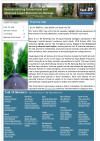
Jim McMillan, Jack Saddler, Susan van Dyk
Herausgeber: IEA Bioenergy Task 39
Englisch, 17 Seiten
Downloads zur Publikation
Policy Brief 1: Motor Systems Tool for efficient system design
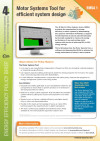
Herausgeber: Electric Motor Systems Annex
Englisch, 2 Seiten
Downloads zur Publikation
Enard Annex II DG System Integration in Distribution Networks
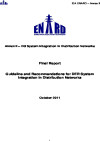
Guideline and Recommendations for DER System Integration in Distribution Networks
Helfried Brunner, Kari Mäki, Carsten Strunge
Englisch, 57 Seiten
Downloads zur Publikation
Technology development for sustainable buildings
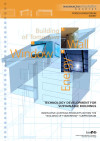
Innovative Austrian Products within the "Building of Tomorrow" Subprogram
Forschungsforum
3/2007
Herausgeber: BMVIT
Englisch, 6 Seiten
Downloads zur Publikation
IEA-4E Benchmarking Bericht: Verbaute Flüssigkeitskühlsätze
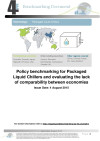
Herausgeber: IEA - 4E
Englisch, 78 Seiten
Downloads zur Publikation
Inhabitants-friendly passive house renovation in Klosterneuburg / Kierling

Renovation of an apartment house from the 1970s as passive house using renewable energy.
RAILWASTE - Production of railway sleepers by mixed plastic waste (SUSPRISE Joint Call)
Production of railway crossties ("sleepers") from an alternative (renewable) raw material
Gas cleaning for low tar producer gases from staged biomass gasification
Investigation on gas cooling, on heat management in staged gasification systems, and on gas cleaning from inorganic pollutants, like ammonia and aerosols, of the low-tar producer gas in decentralized staged biomass gasification.
Analysis for positioning a R&D-focus on "Building integrated Photovoltaic" in Austria
This study investigates if technologies of building integrated Photovoltaic could be developed and produced in Austria for being competitive on the global market. What starting position of the national PV industry and research is given and what steps are needed in order to seize this opportunity.
Operational and maintenance costs in passive houses and low energy houses
How much energy does a passive house actually save? Does a passive house pay-off by itself? What are the costs for maintancence? For the first time an approximation for the running costs of a passive house were systematically documented and compared.
ÖkoInform - Platform for Exchange of Information in Green Building

A platform for the exchange of information to promote the better integration of ecological materials and renewable resources in the research programme "Building of Tomorrow"
Technology Roadmap, Carbon Capture and Storage, IEA 2009

Der Fahrplan zu Carbon Capture and Storage zeigt den aktuellen Status sowie die notwendigen nächsten Schritte aus Sicht der Finanzierung, Gesetzgebung, des öffentlichen Bewusstseins und der internationalen Zusammenarbeit.
International Energy Agency
Englisch, 52 Seiten
Downloads zur Publikation
Renewable Energy Sources and Technologies in Austria
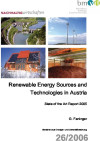
State of the Art Report 2005
Schriftenreihe
26/2006
G. Faninger
Englisch, 87 Seiten
Downloads zur Publikation
Berichte aus Energie- und Umweltforschung 32/2002Policy Pathways for PromotingEnvironmental Management Accounting
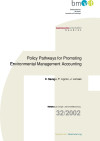
Implementation of EMA as a standard tool regarding the calculation of environmental and material (flow) costs - a project report on a procedure that may form a new basis for the calculation of financial profitability of business optinons of sustainability.
Schriftenreihe
32/2002
D. Savage, P.Lignon, J. Lomsek
Herausgeber: Im Auftrag des Bundesministeriums für Wissenschaft und Verkehr
Englisch, 99 Seiten
Downloads zur Publikation
Post-combustion carbon capture from coal fired plants - solvent scrubbing (Davidson, 07-2007)

Englisch
Smart Energy Networks - Research Activities in Europe
27. Feb 2007 - 28. Feb 2007
TECHbase Vienna, arsenal researchVienna, AT
National and Regional R&D Programmes, EC Information and Brokerage Day Call 1 FP7
Sustainable Regional Planning In Austria

The project "Ökofit" - research for integrated technology
Forschungsforum
4/1996
Herausgeber: BMVIT
Englisch, 6 Seiten
City Cooling - Intelligent district cooling implementation, Vienna
Development of an intelligent district cooling concept and alternative solutions for heat rejection from central absorption chillers at the example of the neighbourhood TownTown in Vienna.
The Passive House Catalogue of Building details for renovations
"Building of Tomorrow" funded research reports dealing with building renovation will be analysed for solutions of construction details. This information will be supplemented with structural-physical descriptions, ecological ratings and technical discussions. All the information will be collected and systematically presented in a catalogue of building details for renovation.
EGRD Workshop: Island Energy - Status and Perspectives
5. - 6. October 2015
Tokyo, JP
This workshop focussed on the energy challenges, strategy and technological solutions on islands and remote, sparsely populated areas. The workshop explored the similarities and differences in a variety of cases in order to summarize lessons learnt, not least in terms of technological solutions.
